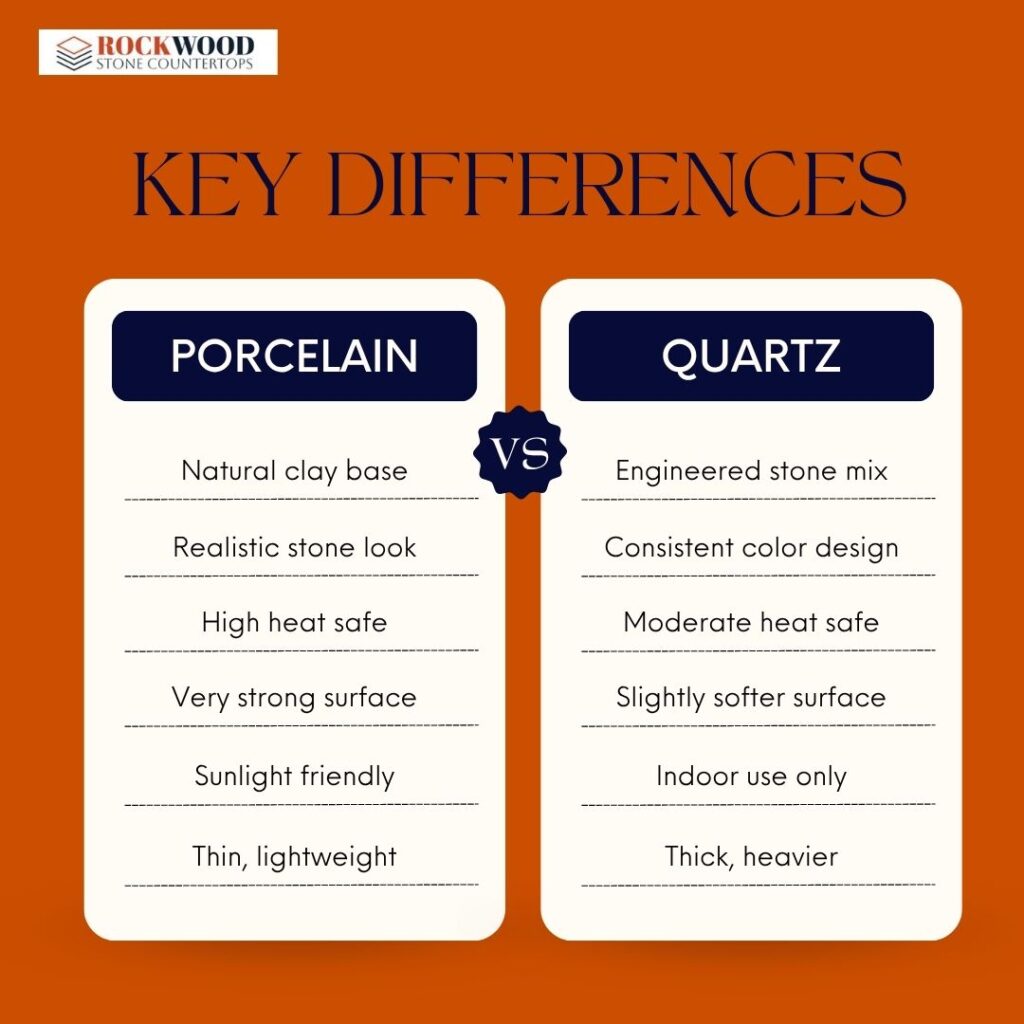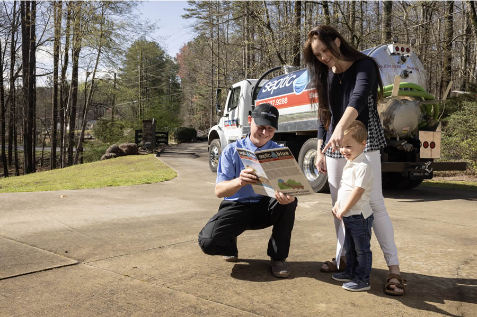- 1. Material Composition: Nature vs. Engineering
- 2. Appearance: Variety vs. Realism
- 3. Heat Resistance: Porcelain Takes the Lead
- 4. Resistance to Heat: Porcelain Leads the Way
- 5. Scratch Resistance Both of them are tough, but one is tougher
- 6. Stain Resistance and Maintenance
- 7. Thickness and Installation Flexibility
- 8. Durability and Longevity
- 9. Cost and Value
- Quick Comparison Table
- How to Choose What’s Right for You
- Why Winnipeg Homeowners Trust Rockwood Stone Countertops
- Final Thoughts
There is a lot of confusion associated with selecting a countertop to use in your home. With the number of materials, finishes and prices, one can get lost easily. However, there are two names that usually come to mind, and these are porcelain and quartz.
When you were considering a kitchen or a bathroom renovation in Winnipeg, you likely asked yourself, Which one would be better in my house?
They are not similar as both provide amazing beauty and performance. In this step-by-step guide, we will explain the 9 main differences between porcelain and quartz countertops so that you are able to make a sure and long-lasting decision on what you want in your space.
At Rockwood Stone Countertops, we have assisted hundreds of Winnipeg homeowners in making the correct decision regarding the type of surface to install in their homes that would match the design, durability and cost. We shall now delve into what actually makes porcelain countertops in Winnipeg any different than quartz – and how to determine which one to choose.

1. Material Composition: Nature vs. Engineering
Porcelains are made of refined clay and natural minerals and baked at very high temperatures. The result? It has a thick, extremely hard surface that is almost heat and stainproof.
Quartz, however, is a man-made quartz of 9095% natural quartz combined with resins and colourings. It is artificial, providing uniformity of hue and pattern.
Quick comparison:
- Porcelain: 100% inorganic, made from kaolin clay and feldspar.
- Quartz: A mix of natural quartz and binding resins.
Because porcelain is non-porous and resin-free, it’s better for those seeking an eco-friendly, natural surface. See the proper guide on eco-friendly porcelain countertop benefits.
2. Appearance: Variety vs. Realism
Quartz wins in the variety department. Since it’s man-made, manufacturers can control the colour, pattern, and veining — even mimic marble or granite.
Porcelain, however, excels at realism. Modern digital printing allows porcelain slabs to replicate natural stone textures with incredible precision. You can find porcelain that looks exactly like marble, concrete, or wood.
Style Tip: If you want a sleek, modern kitchen, porcelain’s large-format slabs create seamless surfaces that quartz can’t always achieve.
3. Heat Resistance: Porcelain Takes the Lead
This is where porcelain shines — literally. Fired at temperatures above 1,200°C (2,200°F), it can easily handle hot pots, pans, and trays.
Quartz, while durable, contains resin binders that can discolour or warp under direct heat. You’ll need trivets or pads to protect it.
Fact: Porcelain’s melting point exceeds 2,600°F, making it ideal for Winnipeg kitchens where cooking is part of daily life.
4. Resistance to Heat: Porcelain Leads the Way
It is here that porcelain glitters, so to speak. Heated at more than 1,200 °C, it is capable of working with hot pots, pans and trays.
Quartz, being a hard material, has resin binders that may discolour or distort when subjected to direct heat. You will require trivets or pads to cover it.
Fact: the melting point of porcelain is more than 2,600 °C; hence, it is perfect in Winnipeg kitchens where cooking is an everyday activity.
5. Scratch Resistance Both of them are tough, but one is tougher
Both materials are incredibly strong, yet porcelain slightly fades ahead. Porcelain is rated between 7-8 on the Mohs hardness scale, whereas quartz has an average of 7.
It implies that porcelain is a little bit harder to scratch due to knives, cookware or dropped utensils.
- Stylistic Advice: It is impossible to cut something without using a cutting board, no matter what the material is, just because your knives need it!
- Both materials are incredibly strong, but porcelain edges out slightly. On the Mohs hardness scale, porcelain ranks around 7–8, while quartz averages 7.
- That means porcelain is slightly more resistant to scratches from knives, cookware, or dropped utensils.
Pro Tip: Regardless of material, always use a cutting board — not because the surface needs protection, but because your knives do!
6. Stain Resistance and Maintenance
Porcelain is non-porous, so it resists stains from coffee, wine, and sauces naturally. It doesn’t need sealing — ever.
Quartz is also non-porous but can be affected by strong chemicals or permanent dyes.
Maintenance tips:
- Clean with mild soap and water.
- Avoid abrasive sponges or harsh bleach.
- Wipe spills quickly, especially on lighter quartz shades.
Both are low-maintenance, but porcelain requires the least upkeep over time.
7. Thickness and Installation Flexibility
Porcelain slabs come in thicknesses as thin as 6mm, making them lightweight and ideal for vertical applications like walls, backsplashes, or shower surrounds.
Quartz is heavier and thicker — typically 20mm to 30mm — which limits design flexibility.
Porcelain advantages:
- It can be used on walls, floors, and counters.
- Easier to install on existing surfaces.
- Suitable for large seamless designs.
For sleek, minimalist kitchens, porcelain offers unmatched versatility.
8. Durability and Longevity
When installed properly, both materials can last 20–25 years or more. But their durability depends on usage:
- Porcelain: More resistant to heat, UV rays, and scratches.
- Quartz: Better at handling heavy impact due to its resin flexibility.
In Winnipeg’s varying climate — where temperature changes can affect materials — porcelain’s stability gives it a slight edge for long-term durability.
Source: The Natural Stone Institute reports porcelain’s lifespan can exceed 25 years with minimal wear.
9. Cost and Value
Pricing varies by brand, design, and thickness, but here’s a general range in Winnipeg:
- Porcelain Countertops: $85–$120 per sq. ft.
- Quartz Countertops: $70–$110 per sq. ft.
While quartz can be slightly cheaper, porcelain’s added heat, UV, and scratch resistance make it a more value-driven investment over time.
Pro Insight: Homebuyers often see porcelain as a premium material — meaning higher resale appeal and long-term value.
Quick Comparison Table
| Feature | Porcelain | Quartz |
| Heat Resistance | Excellent | Moderate |
| Scratch Resistance | Very High | High |
| UV Resistance | Yes | No |
| Maintenance | Very Low | Low |
| Thickness Options | 6mm–12mm | 20mm–30mm |
| Indoor/Outdoor Use | Both | Indoor Only |
| Durability | 25+ years | 20+ years |
| Price Range (per sq. ft.) | $85–$120 | $70–$110 |
How to Choose What’s Right for You
Choose Porcelain if:
- You love cooking and need heat resistance.
- You want a surface that works indoors and outdoors.
- You prefer minimal maintenance.
Choose Quartz if:
- You want a wide range of colours and patterns.
- You prioritize consistency in design.
- You’re working within a slightly lower budget.
Why Winnipeg Homeowners Trust Rockwood Stone Countertops
At Rockwood Stone Countertops, we specialize in crafting porcelain countertops in Winnipeg that deliver style, strength, and long-term performance.
Our fabrication team ensures precise installation, beautiful seam alignment, and expert edge finishing — giving your home the elegance it deserves.
Why choose us:
- 20+ years of fabrication experience
- Wide selection of premium porcelain slabs
- Professional design consultation and installation
- Locally trusted in Winnipeg for quality and reliability
Whether you’re building new or renovating, Rockwood Stone Countertops helps you pick the perfect surface that matches your lifestyle and design vision.
Final Thoughts
Both porcelain and quartz are top-tier materials, but their differences matter depending on how and where you use them.
If you want maximum heat resistance, minimal maintenance, and outdoor flexibility, porcelain is your winner.
For expert help choosing the right surface for your Winnipeg home, visit Rockwood Stone Countertops — your trusted local experts in premium stone fabrication and installation.


